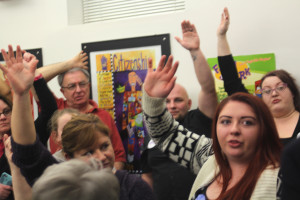The usual cacophony of hungry teenagers talking over each other, trying to squeeze a full day’s events into their 30-minute lunch break was gone. Replacing it was the calm rumble of politically-inclined, aging middle-class voters.
Scanning the room, I looked for familiar faces, but I only recognized a few people. What did I expect? I’ve only lived here for two years. 
I was attending the Democratic caucus and I knew I would be supporting either Sanders or Clinton. My decision changed every day and the closer caucus night got, the more times a day my decision changed.
The pressure of being in Iowa and the national importance placed on this state’s results made me feel like my vote was important here and I needed to choose the “right” candidate. I have never felt this kind of pressure in any other election. Additionally, caucusing instead of voting was also new to me.
I have participated in five prior elections, but this would be my first time caucusing. I previously voted in three other states that all participated in the standard primary election process. To tell the truth, I didn’t know there was another way.
The bombardment of ads did not help relieve the pressure I was feeling. One day, the week before the caucus was scheduled, three political flyers showed up in my mail; two
were from the same campaign and one presumed I had already made my decision.
The Saturday before caucus night, Clinton’s campaign called me asking if I would support her. Then Sunday night three Sanders supporters showed up on my doorstep asking for my vote. I had to tell both parties “I haven’t decided yet.” Never before have I gotten so much personal attention during a political election.
This made me feel special and important, but it also made me feel overwhelmed and scared of making the “wrong” decision. I was still undecided when I walked into the high school cafeteria.
Our numbers were small with only 123 voters at our Johnston caucus precinct. When I arrived and chose not to put on a candidate’s sticker both the Sanders and Clinton camp volunteer asked me if I had any questions. “Nope.” I knew the facts about both candidates. I knew the pros and cons of both decisions. I just didn’t know which pros I liked better.
The elected officiate began by explaining how the night would proceed. She had three speeches from the candidates, but chose not to read those aloud to us because she “didn’t like her voice.” She left them on the table for us to read if we wanted.
Then it was time to stand up and choose a side of the room. I backed away from both groups and stood near the front by myself. I watched as the Clinton supporters sounded off their count at the same time as the Sanders supporters.
When the counting was done, I asked the officiate what I was supposed to do.
Seeming to not understand my question I asked again. “I haven’t decided yet. What am I supposed to do now?”
Surprised, she asked “Well, do you have any questions about the candidates?”
“No.”
I scanned the room for other undecided voters so I could follow their lead. Instead I only saw two groups, one about 1/3 the size of the other.
I was told “Go talk to people and make a decision.”
Not knowing where to go or who to talk to, I found a familiar face in the crowd and went to ask my neighbor’s opinion. He was a staunch pro-gun activist but was voting for Clinton. I wanted to understand why.
After about five minutes, I realized my time to “figure things out” was up when the people at the front of the group started counting off again. I had finally made a decision and allowed myself to be counted.
My husband reported to me that the first count off had tallied one undecided voter. That was the reason I couldn’t follow someone else’s lead. I was that one undecided vote.
After being contacted personally by both campaigns and the bombardment of mailings, I was disappointed when fellow caucus goers made no effort to win me over.
Without the assistance of others I finally “figured things out.” I wasn’t an undecided voter because I wanted both sides to fight for me and try to win me over, but the campaign supporters in that room could have had a greater impact on my decision than the earlier less personal attempts.





Comments